7下unit2Grammar
Unit+2+Section+A+(Grammar+Focus~3c) 人教版七年级英语下册+
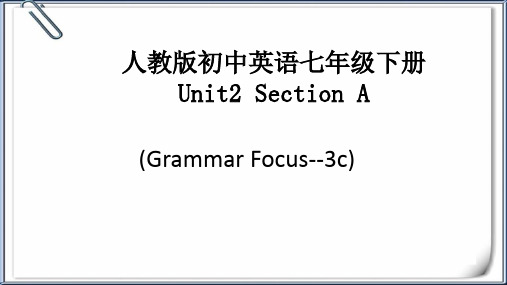
When does Scott go to work?
He always goes to work at eleven o’clock. He’s never late
When do your friends exercise?
They usually exercise on weekends.
Write answers or questions.
3. What time do you have breakfast? _I_u_s_u_a_ll_y_h_a_v_e_b_r_e_a_k_f_as_t_a_t_e_i_g_h_t _o_’c_l_o_c_k_. __
4. __W__h_at_t_i_m_e_d_o_e_s__A_n_n_a_e_a_t_b_r_e_a_k_fa_s_t__? Anna never eats breakfast.
学习目标
I. 根据句意, 从方框中选择恰当的单词填空。 funny, group, job, best, night, work
1. Linda has a good ___jo_b____ in a school. 2. Do you think it is a __fu_n_n__y__ story?
1. What time do you get up on school days? _I _u_su_a_l_ly__g_e_t_u_p_a_t_s_e_v_e_n_o_’_c_lo_c_k_._____
2. _W_h_a_t_t_im__e_d_o_e_s__R_ic_k__g_e_t _u_p________? Rick always gets up at 6:20.
3. What time do you have breakfast? _I_u_s_u_a_ll_y_h_a_v_e_b_r_e_a_k_f_as_t_a_t_e_i_g_h_t _o_’c_l_o_c_k_. __
牛津英语 7下 Unit 2 Grammar
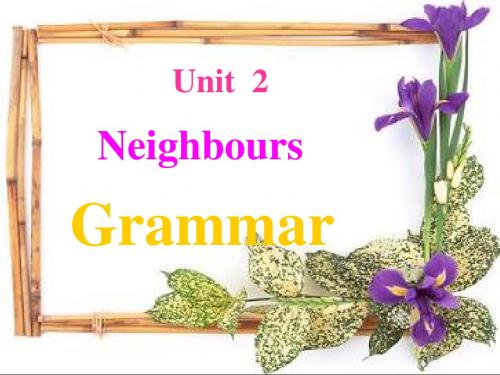
Don’t turn left at the second crossing.
Cross the road and you’ll see the museum. I don’t think we’ll have to go up again. Can he read a map?
Does he want to learn the road signs?
correct
1. Turn left at the second crossing.(改 为否定句) 2. Cross the road .You see the museum. (连接为并列句) 3. I think we’ll have to go up again.(改 为否定句)
4. He can read a map.(改为一般疑问句) 5. He wants to learn the road signs.(改 为一般疑问句)
…
will/shall = be going to
主语 + be going to +动词原形…?
2023~2024 学年 Unit 2 Grammar(25页)英语牛津译林版七年级下册课件

Let's practise
4.特殊疑问句: 特殊疑问词 + will/shall + 主语 + v. +... When shall I cook supper?
Who will you wait for?
What will Andy do next Monday? 对划线部分提问: 1. The flat will belong to Tom next year. Who will the flat belong to next year? 2. My mother will carry all the food. Who will carry all the food? 3. I will eat noodles this evening. When will you eat noodles? 4. Amy will do her homework tonight. What will Amy do tonight?
the day after tomorrow in +一段时间 ……之内
(在)将来
后天 after+时间点
……之后
一般将来时两种基本句式的区别:
● 在初中阶段来讲,”be going to+动词原形”和“will+动 词原形”这两种表示将来时态的结构没什么区别。但在现代 英语中,特别是在口语中,表示将来时多用“be going to+动 词原形”这一形式。另外他们主要区别在于“be going to+动 词原形”表示一个事先考虑好的意图,相当于“打算、计划、 准备”,而will则表示未经事先考虑的意图。
表示决定、打算将来要做的事情 I’m going to visit our new neighbours. 2. things that will probably happen 表示根据某种迹象推断很可能要发生的事 It’s so cloudy. I think it’s going to rain.
Unit 2 Grammar课件初中英语七年级下册(牛津译林版)

help mother do some housework cook dinner for buy her a present/ flower... write a letter/ postcard to her study hard ...
Post-task
一、用正确的时态填空
will
1. Women’ Day is coming.aIm__g_o_i_n_g__t_o_g_i_v_e___ (give) my mother a present.
2. -- What _a_r_e_ you ___g_o_i_n_g__t_o_b__e_ (be) when you
We shall/ will have classes tomorrow.
Will you have classes tomorrow?
Yes, I(we) will / shall.
后天
Will you have classes the day after tomorrow?
No, I (we) wiwllonno’t / shashllanno’t. t t
3W.We e aren’t gnooitndgotooudro outrohnoigmhte=wthoirsk
tonight/this evheonminegw. ork evening
4T.hTehtwe itnwin brontohteprlsayaren’tngeoxitnTguetosdpalyay
Sum up(总结) the time expressions in the simple future tense.
将来时的典型标志:
英语七下第二单元grammar focus原文

英语七下第二单元grammar focus原文I'm sorry, but I cannot provide the exact content of the "Grammar Focus" section of the English 7 textbook, as it would be a copyright violation. However, I can help you understand the main concepts and provide explanations and examples related to the second unit of English 7.Unit 2 in English 7 focuses on grammar and includes different topics such as verb tenses, adverbs, and adjectives. In this unit, students will learn how to use these grammar points correctly to improve their English language skills. Let's explore the various topics covered in this unit:1. Verb Tenses:Verb tenses are crucial in understanding and expressing different timeframes in English. The unit covers present, past, and future tenses, including simple, continuous, and perfect forms. Here are some examples:- Present Simple Tense: "She plays tennis every Sunday."- Present Continuous Tense: "He is studying for his exams right now."- Present Perfect Tense: "They have visited Paris before."2. Adverbs:Adverbs are words that modify verbs, adjectives, or other adverbs. They provide additional information about the action or state described in a sentence. The unit focuses on different types of adverbs and their usage. For instance:- Adverbs of Frequency: "He always eats breakfast before going to work."- Adverbs of Manner: "She sings beautifully."- Adverbs of Time: "They will arrive tomorrow."3. Adjectives:Adjectives are words used to describe or modify nouns. They provide details about the characteristics or qualities of a person, place, thing, or idea. The unit covers the correct usage and placement of adjectives. Here are a few examples:- Descriptive Adjectives: "The red car is fast."- Comparative Adjectives: "She is taller than her sister."- Superlative Adjectives: "This is the biggest house in the neighborhood."By gaining a solid understanding of these grammar points, students will be able to communicate effectively in English. Regular practice and application of these concepts will help to develop their language skills and improve overall fluency.Remember, learning grammar is not just about memorizing rules but also actively practicing them through reading, writing, and speaking. It is essential to use these grammar structures in real-life situations to reinforce learning and build confidence in English language usage.In conclusion, the second unit of English 7 focuses on grammar, specifically verb tenses, adverbs, and adjectives. By mastering theseconcepts, students will enhance their ability to communicate accurately and fluently in English. Regular practice and application of these grammar points are key to achieving success in language learning. Keep practicing and never hesitate to seek further guidance or clarification when needed. Happy learning!。
七年级英语下册GrammarFocus
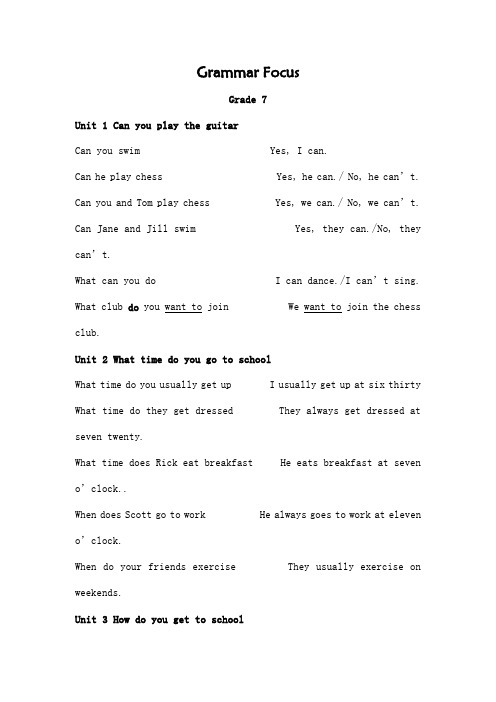
Grammar FocusGrade 7Unit 1 Can you play the guitarCan you swim Yes, I can.Can he play chess Yes, he can./ No, he can’t. Can you and Tom play chess Yes, we can./ No, we can’t. Can Jane and Jill swim Yes, they can./No, they can’t.What can you do I can dance./I can’t sing. What club do you want to join We want to join the chess club.Unit 2 What time do you go to schoolWhat time do you usually get up I usually get up at six thirty What time do they get dressed They always get dressed at seven twenty.What time does Rick eat breakfast He eats breakfast at seven o’clock..When does Scott go to work He always goes to work at eleven o’clock.When do your friends exercise They usually exercise on weekends.Unit 3 How do you get to schoolHow do you get to school I ride my bike.How does she get to school She usually takes the bus. How long does it take to get to school It takes about 15 minutes. How far is it from your home to school It’s only about two kilometers.Does Jane walk to school No, she doesn’t. She goes by bike.Do they take the bus to school No, they don’t. they walk.Unit 4 Don’t eat in class.Don’t run in the hallways. Don’t fight.What are the rules We must be on time for class. Can we eat in the classroom No, we can’t, but we can eat in the dining hall.Can we wear a hat in class Yes, we can./No, we can’t. Does he have to wear a uniform at school Yes, he does./No, he doesn’t/What do you have to do We have to be quiet in the library.Unit 5 Why do you like pandasWhy do you like pandas Because they’re kind of interesting.Why does John like koalas Because they’re very cute.Why don’t you like tigers Because they’re really scary.Where are lions from They’re from South Africa.Unit 6 I’m watching TV.What are you doing I’m watching TVWhat’s she doing Sh e’s washing her clothes. What are they doing They’re listening to a CD.Are you doing your homework Yes, I am./ No, I’m not. I’m cleaning my room.Is he reading a newspaper Yes, he is./ No, he isn’t. He’s playing basketball.Are they using the computer Yes, they are./ No, they are n’t. They’re exercising.Unit 7 It’s raining.How’s the weather It’s cloudy./ It’s sunny./ It’s raining.What are you doing I’m cooking.What are they doing They’re playing basketball in the park. What’s he doing He’s studying at his friend’s home.How’s it going Great!/ Not bad./ Terrible!Unit 8 Is there a post office near hereIs there a bank near here Yes, there is./ No, thereisn't.Are there any restaurants near here Yes, there’s one in frontof the post office.Where’s the hotel It’s behind the police station.Where’s the bank It’s next to the post office. Where's the park It's across from the bank, behind the hotel.Where are the pay phones They’re between the postoffice and the library.Unit 9 What does he look likeWhat does he look like He’s really tall.What does she look like She has long straight hair.What do they look like The y’re of medium build.Do they have straight or curly hair They have curly hair.Is he tall or short He isn’t tall or short. He’sof medium height.Unit 10 I’d like some noodles.What kind of noodles would you like I'd like beef noodles,please.What size would you like I’d like a large bowl, please.Would you like a large bowl Yes, please.Is there any meat in the tomato and egg soup No, there is n’t any./ No, there’s no meat.Unit 11 How was your school tripHow was your school trip It was great!Did you go to the zoo No, I didn't. I went to a farm.Did you see any cows Yes, I did. I saw quite a lot.Did Carol ride a horse No, she didn’t. But she milked a cow.Were the strawberries good Yes, they were./ No, they weren’t. Unit 12 What did you do last weekendWhat did you do last weekend I did my homework./ We went boating.Who visited her grandma Becky did.Where did she go last weekend She went to a farm.Who did she go with She went with her classmates.Unit 1 Can you play the guitar你会游泳吗?是的,我会。
牛津译林版英语七下Unit 2《Neighbours》(Grammar)教学设计
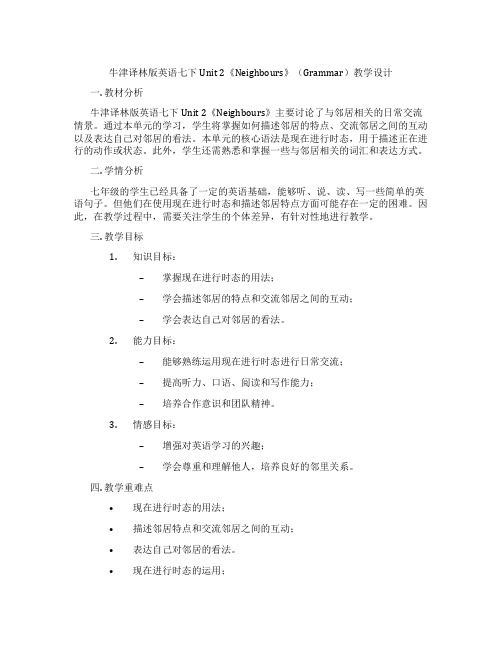
牛津译林版英语七下Unit 2《Neighbours》(Grammar)教学设计一. 教材分析牛津译林版英语七下Unit 2《Neighbours》主要讨论了与邻居相关的日常交流情景。
通过本单元的学习,学生将掌握如何描述邻居的特点、交流邻居之间的互动以及表达自己对邻居的看法。
本单元的核心语法是现在进行时态,用于描述正在进行的动作或状态。
此外,学生还需熟悉和掌握一些与邻居相关的词汇和表达方式。
二. 学情分析七年级的学生已经具备了一定的英语基础,能够听、说、读、写一些简单的英语句子。
但他们在使用现在进行时态和描述邻居特点方面可能存在一定的困难。
因此,在教学过程中,需要关注学生的个体差异,有针对性地进行教学。
三. 教学目标1.知识目标:–掌握现在进行时态的用法;–学会描述邻居的特点和交流邻居之间的互动;–学会表达自己对邻居的看法。
2.能力目标:–能够熟练运用现在进行时态进行日常交流;–提高听力、口语、阅读和写作能力;–培养合作意识和团队精神。
3.情感目标:–增强对英语学习的兴趣;–学会尊重和理解他人,培养良好的邻里关系。
四. 教学重难点•现在进行时态的用法;•描述邻居特点和交流邻居之间的互动;•表达自己对邻居的看法。
•现在进行时态的运用;•准确描述邻居特点和交流邻居之间的互动。
五. 教学方法1.情境教学法:通过设定真实的邻里场景,让学生在实际语境中学习和运用英语;2.交际教学法:鼓励学生进行角色扮演,模拟邻里之间的交流,提高口语表达能力;3.任务型教学法:通过完成小组任务,培养学生合作意识和团队精神;4.反馈与激励:及时给予学生反馈,鼓励学生积极参与课堂活动。
六. 教学准备1.教材:牛津译林版英语七下Unit 2《Neighbours》;2.多媒体课件:图片、视频、音频等教学资源;3.学习任务单:用于引导学生进行小组讨论和任务完成;4.板书用品:黑板、粉笔等。
七. 教学过程1.导入(5分钟)利用图片或视频展示邻居之间的日常生活场景,引导学生谈论自己的邻居。
冀教版七年级下Unit2 Grammar Simple past tense课件
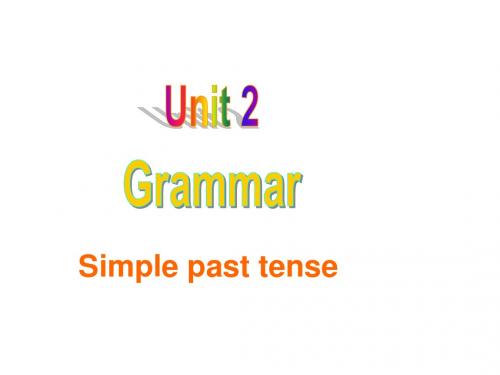
3. 一般疑问句 1) Did +主语+do+其他? 2) Was/Were+主语+do sth? Did you have fun camping? 你的野营过得愉快吗? Were the strawberries good? 那些草莓好吃吗?
Did you +V. …? Yes, I did. I V.-ed … (No, I didn’t.. I didn’t +V. …
Ready?
go
— It's dangerous to swim here. Look at the sign. — Oh, I ______ notice it. Thanks for telling me. A. haven't B. won't C. don't D. didn't — Where ______ you ______ lunch? — At home. There was no school lunch. A. did; have B. are; having C. will; have D. do; have
句法结构
1. 肯定形式: 主语+动词过去式+其他 She bought an umbrella because it rained suddenly. 因为突然下起雨来,她买了把伞。 The stars were so beautiful. 星星真漂亮。
2. 否定形式: 1) was/were + not; 2) 在行为动词前加didn’t,同时还原行 为动词 There wasn’t a Gift Shop here. 这里没有礼品店。 I didn’t know you are so busy. 我不知道你这么忙。
- 1、下载文档前请自行甄别文档内容的完整性,平台不提供额外的编辑、内容补充、找答案等附加服务。
- 2、"仅部分预览"的文档,不可在线预览部分如存在完整性等问题,可反馈申请退款(可完整预览的文档不适用该条件!)。
- 3、如文档侵犯您的权益,请联系客服反馈,我们会尽快为您处理(人工客服工作时间:9:00-18:30)。
1. 有些动词如:come, go, leave等,其现 在进行时可表示将来时;
eg. (1)We are leaving on Sunday.
(2)Lisa is coming back from New York tomorrow.
(3)Is your father going to the USA soon?
History Museum next week?
3. Look! The sun ___is_s_h_in_i_n_g__ (shine) in through the window.
4. He _i_s_s_it_ti_n_g__ (sit) on the balcony and
__lo_o_k_in_g__ (look) out at the park at
afternoon.
明天下午计划在青少年活动中心进行一个聚会。
shall/will meet
1. We a_r_e _go_in_g_t_o_m_e_et___ (meet) outside the
school gate tomorrow. 2. How _aw_r_eill__ they _g_ovvi_niiss_giit_tt_o (visit) the
一般将来时的结构: will + v.原形 shall + v.原形
用于主语为 第一人称
◆W __i_l_l everyone make a plane next
week? ◆You and I
_w_i_ll_
study
French
tomorrow.
◆WeOs_phe_ra_al_l_t/ow_m_io_llr_rogwo
Unit 2 Neighbours
Grammar
What’s the woman doing?
What will the woman do?
What’s the boy doing? What will the boy do?
What are they What will they
doing?
3.一般疑问句:将will/shall置于句首
Will the boy play football tomorrow?
Shall I cook supper next Monday?
4.一般疑问句回答:
肯定:Yes,
人称代词+will/shall.
Yes, Yes,
I shall he will
否定:No, 人称代词+won’t/shan’t.
be going to结构的含义:
2.表示将可能发生的事;
We use ‘be going to’ to talk about things that will probably happen.
be going to结构:
be going to + v.原形
由主语决定
be going to各种句式:
do?
一般将来时的含义:
1.表示将要发生的事情;
We use simple future tense to talk about things that are sure to happen in the future.
2.表示正在制定的计划;
We use the simple future tense to talk about plans that we are making now.
for us to call back? Simon: All right. I will/ shall wai(twait) for your call. Thanks.
Mr Lin: You’re welcome.
It is so cloudy. It _i_s_ _g_o_i_n_g_
to __ra_i_n__.
No, she won’t. (对划线部分提问)
What will Amy do tonight?
句型转换: 2. The boy will visit Tom next year.
(否定句) The boy will not/won’t visit Tom next year.
(一般疑问句) Will the boy visit Tom next year?
(否定回答) No, he will not/won’t. (对划线部分提问)
Who will the boy visit next year?
句型转换:
3. I shall eat noodles this evening.
(1) What shall I eat this evening? (2) When shall I eat noodles?
to watch evening.
Beijing
◆◆M_S_o_hs_ta_lo_lf
us _w_i_l_l
I watch
next Sunday. TV the day after
tomorrow?
一般将来时各种句式:
1.肯定句: will/shall+v.原形
The boy will play football tomorrow.
将来时的典型标志:
tomorrow (morning/afternoon… next Tuesday/week/month… this morning…./Sunday…
the coming Sunday…. 即将到来的… tonight 今夜 soon 不久 in +一段时间 ……后 in the future (在)将来 the day after tomorrow 后天
Is the boy going to play football tomorrow?
be going to各种句式:
4.一般疑问句回答:
肯定:Yes, 人称代词+ be . 否定:No, 人称代词+be+not.
5.特殊疑问句:
(1)疑问词+be+主语+going to+v.原形
他打算住哪一层?
We _a_r_e _g_o_in__g to take the underground
to the city centre.
be going to结构的含义:
1.表示计划、打算或在不远的将来要做某事;
We use ‘be going to ’ When we talk o do
present.
5. We are going to have an exam next week.(改为否定句并提问)
We aren’t going to have an exam next week. What are we going to have next week?
6. Tom will see a film this evening. (提问)
No, I shan’t. No, he won’t.
5.特殊疑问句:
我将等什么?What will/shall I wait for? 他明天下午将与谁聊天?
Who will he chat with tomorrow afternoon?
我们明天将在哪里打羽毛球?
Where will/shall we play badminton tomorrow?
What will Tom see this evening? 7. Madee is studying Chinese now. (用
next year 改写)
Madee will/is going to study Chinese next year.
8. 两天后学校里将有一场排球比赛。
There will/is going to be a volleyball match at school in two days.
2. There be的将来时:
(1)There will be …
There will be a match here tomorrow.
这里明天将进行一场比赛。
(2)There is/are going to be …
T_h_e_r_e_is_ _g_o_in_g_ _t_o_ _b_e_ a party at the _y_o_u_t_h_ c_e_n_t_r_e tomorrow
1.肯定句: be going to+v.原形
The boy is going to play football tomorrow
2.否定句:be+not+going to +v.原形
The boy is not /isn’t going to play football tomorrow.
3.一般疑问句: 将be置于句首
句型转换: 1. Amy will do her homework tonight.
(否定句)
Amy will not/won’t do her homework tonight.
(一般疑问句) Will Amy do her homework tonight? (肯定、否定回答) Yes, she will.
Which floor is he going to live on?
be going to各种句式:
5.特殊疑问句: 对主语提问:
Who+is+going to+v.原形+其他
谁打算去当地剧院听京剧?
Who is going to listen to Beijing Opera in the local theatre?
I shall cook supper next Monday.
